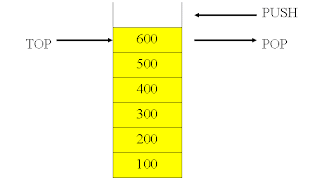What is a stack? How to implement stacks using C++?
- Stack is a last-in, first-out (LIFO) data structure. i.e. the element added last to the stack will be the one to be removed first.
- Typical use cases of stacks include:- (1) During debugging it is quite common to examine the function call stack during panics. (2) In RTOS like Symbian there are concepts like cleanup stack to avoid memory leaks.
- Some of the common terminology associated with stacks inlcude PUSH, POP and TOP of the stack.
- PUSH refers to adding an element to the stack.
- POP refers to removing an element from the stack.
- TOP refers to the first element that could be POPed (or) the last element PUSHed.
- Diagram below explains the stack.

EXAMPLE: Demonstrate the implementation of a simple stack using arrays.
#include <iostream>
using namespace std;
const int MAX_SIZE = 100;
class StackOverFlowException
{
public:
StackOverFlowException()
{
cout << "Stack overflow" << endl;
}
};
class StackUnderFlowException
{
public:
StackUnderFlowException()
{
cout << "Stack underflow" << endl;
}
};
class ArrayStack
{
private:
int data[MAX_SIZE];
int top;
public:
ArrayStack()
{
top = -1;
}
void Push(int element)
{
if ( top >= MAX_SIZE )
{
throw new StackOverFlowException();
}
data[++top] = element;
}
int Pop()
{
if ( top == -1 )
{
throw new StackUnderFlowException();
}
return data[top--];
}
int Top()
{
return data[top];
}
int Size()
{
return top + 1;
}
bool isEmpty()
{
return ( top == -1 ) ? true : false;
}
};
int main()
{
ArrayStack s;
try {
if ( s.isEmpty() )
{
cout << "Stack is empty" << endl;
}
// Push elements
s.Push(100);
s.Push(200);
// Size of stack
cout << "Size of stack = " << s.Size() << endl;
// Top element
cout << s.Top() << endl;
// Pop element
cout << s.Pop() << endl;
// Pop element
cout << s.Pop() << endl;
// Pop element
cout << s.Pop() << endl;
}
catch (...) {
cout << "Some exception occured" << endl;
}
}
OUTPUT:-
Stack is empty
Size of stack = 2
200
200
100
Stack underflow
Some exception occured
EXAMPLE: Demonstrate the implementation of a simple stack using linked lists.
#include <iostream>
using namespace std;
class StackUnderFlowException
{
public:
StackUnderFlowException()
{
cout << "Stack underflow" << endl;
}
};
struct Node
{
int data;
Node* link;
};
class ListStack
{
private:
Node* top;
int count;
public:
ListStack()
{
top = NULL;
count = 0;
}
void Push(int element)
{
Node* temp = new Node();
temp->data = element;
temp->link = top;
top = temp;
count++;
}
int Pop()
{
if ( top == NULL )
{
throw new StackUnderFlowException();
}
int ret = top->data;
Node* temp = top->link;
delete top;
top = temp;
count--;
return ret;
}
int Top()
{
return top->data;
}
int Size()
{
return count;
}
bool isEmpty()
{
return ( top == NULL ) ? true : false;
}
};
int main()
{
ListStack s;
try {
if ( s.isEmpty() )
{
cout << "Stack is empty" << endl;
}
// Push elements
s.Push(100);
s.Push(200);
// Size of stack
cout << "Size of stack = " << s.Size() << endl;
// Top element
cout << s.Top() << endl;
// Pop element
cout << s.Pop() << endl;
// Pop element
cout << s.Pop() << endl;
// Pop element
cout << s.Pop() << endl;
}
catch (...) {
cout << "Some exception occured" << endl;
}
}
OUTPUT:-
Stack is empty
Size of stack = 2
200
200
100
Stack underflow
Some exception occured






0 comments:
Post a Comment